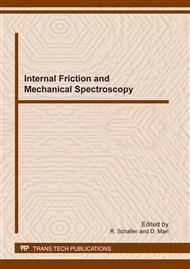[1]
T.S. Kê, Experimental evidence on the viscous behavior of grain boundaries in metals, Phys. Rev. 71 (1947) 533-546.
DOI: 10.1103/physrev.71.533
Google Scholar
[2]
T.S. Kê, Fifty-Year Study of Grain Boundary Relaxation, Metall. Mater. Trans. A30 (1999) 2267-2295.
Google Scholar
[3]
A.S. Nowick and B.S. Berry, Anelastic Relaxation in Crystalline Solids, Academic Press, New York, (1972).
Google Scholar
[4]
H. Gleiter and B. Chalmers, High Angle Grain Boundaries, Pergamon Press, Oxford, (1972).
Google Scholar
[5]
Q. P. Kong, B. Cai, and G. Gottstein, The change of grain boundary internal friction peak during high temperature deformation at different modes, J. Mater. Sci. 36 (2001) 5429-5434.
Google Scholar
[6]
W. Benoit, High temperature relaxation, Mater. Sci. Eng. A370 (2004) 12-20.
Google Scholar
[7]
C. Zener, Elasticity and Anelasticity of Metals, The University of Chicago Press, Chicago, (1948).
Google Scholar
[8]
L. X. Yuan and T. S. Kê, Grain boundary internal friction peaks measured by the forced vibration method, Phys. Stat. Sol. (a), 154 (1996) 573- 581.
DOI: 10.1002/pssa.2211540210
Google Scholar
[9]
Y. Shi, P. Cui, Q. P. Kong, W. B. Jiang, and M. Winning, Internal friction peak in bicrystals with different misorientations, Phys. Rev. B 71, (2005) R060101.
DOI: 10.1103/physrevb.71.060101
Google Scholar
[10]
W. B. Jiang, P. Cui, Q. P. Kong, Y. Shi, and M. Winning, Internal friction peak in pure Al bicrystals with <100> tilt boundaries, Phys. Rev. B 72 (2005) 174118.
DOI: 10.1103/physrevb.72.174118
Google Scholar
[11]
Y. Shi, W. B. Jiang, Q. P. Kong, P. Cui, Q. F. Fang, and M. Winning, Basic mechanism of grain boundary internal friction revealed by a coupling model, Phys. Rev. B 73 (2006) 174101.
DOI: 10.1103/physrevb.73.174101
Google Scholar
[12]
Q. P. Kong, W. B. Jiang , Y. Shi , P. Cui, Q. F. Fang, and M. Winning, Grain boundary internal friction in bicrystals with different misorientations, Mater Sci Eng. A 521-522 (2009) 128-133.
DOI: 10.1016/j.msea.2008.09.118
Google Scholar
[13]
W. B. Jiang, Q. P. Kong, D.A. Molodov and G. Gottstein, Compensation effect in grain boundary internal friction, Acta Mater. 57 (2009) 3327-3331.
DOI: 10.1016/j.actamat.2009.03.040
Google Scholar
[14]
W. B. Jiang, Q. P. Kong, P. Cui, F. Q. Fang, D.A. Molodov and G. Gottstein, Internal friction in Al bicrystals with <111> tilt and twist grain boundaries, Phil. Mag. 90 (2010) 753-764.
DOI: 10.1080/14786430903258192
Google Scholar
[15]
W. B. Jiang, Q. P. Kong, P. Cui, Further evidence of grain boundary internal friction in bicrystals, Mater Sci Eng. A 527 (2010) 6028-6032.
DOI: 10.1016/j.msea.2010.05.091
Google Scholar
[16]
J. P. Hirth and J. Lothe, Theory of Dislocations, John Wiley & Sons, Inc., New York, 1982, p.31.
Google Scholar
[17]
A.P. Sutton and R.W. Balluffi, Interfaces in Crystalline Materials, Oxford University Press, Oxford, (1995).
Google Scholar
[18]
J. C. Hamilton, D. J. Siegel, I. Daruka, and F. Leonard, Why do grain boundaries exhibit finite facet lengths, Phys. Rev. Lett., 90 (2003) 246102.
DOI: 10.1103/physrevlett.90.246102
Google Scholar
[19]
R. Raj and M.F. Ashby, On grain boundary sliding and diffusional creep, Metall. Trans. 2 (1971) 1113-1127.
DOI: 10.1007/bf02664244
Google Scholar
[20]
D.G. Brandon, The structure of high-angle grain boundaries, Acta Metall. 14 (1966) 1479-1484.
DOI: 10.1016/0001-6160(66)90168-4
Google Scholar
[21]
T. Watanabe, Grain boundary engineering: historical perspective and future prospects, J. Mater. Sci. 46 (2011) 4095-4115.
DOI: 10.1007/s10853-011-5393-z
Google Scholar
[22]
K. L. Ngai, Relaxation and Diffusion in Complex Systems, Springer, New York, (2011).
Google Scholar
[23]
K. L. Ngai, Y. N. Wang, and L. B. Magalas, Theoretical basis and general applicability of the coupling model to relaxations in coupled systems, J. Alloys Comps. 211/212 (1994) 327-332.
DOI: 10.1016/0925-8388(94)90513-4
Google Scholar
[24]
L. B. Magalas, Mechanical spectroscopy-fundamentals, Solid State Phynom. 89 (2003) 1-22.
Google Scholar
[25]
X. P. Wang and Q. F. Fang, Mechanical and dielectric relaxation studies on the mechanism of oxygen ion diffusion in La2Mo2O9, Phys. Rev. B 65 (2002) 064304.
Google Scholar
[26]
G. Gottstein and L. S. Shvindlerman, The compensation effect in thermally activated interface processes, Interface Sci., 6 (1998) 265-276.
Google Scholar
[27]
D. A. Molodov, U. Czubayko, G. Gottstein and L. S. Shvindlerman, On the effect of purity and orientation on grain boundary motion, Acta Mater. 46 (1998) 553-564.
DOI: 10.1016/s1359-6454(97)00277-2
Google Scholar
[28]
T. Surholt, D. A. Molodov and Chr. Herzig, Orientation dependence of Ge diffusion along symmetrical.
DOI: 10.1016/s1359-6454(98)00237-7
Google Scholar
[111]
tilt grain boundaries in Al, Acta Mater. 46 (1998) 5345-5355.
Google Scholar


